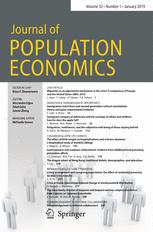Issue 2019/1 of the Journal of Population Economics is published: Please see for the Table of Content: Volume 32, Issue 1, January 2019
The article in the new issue
Immigration restrictions and second-generation cultural assimilation: theory and quasi-experimental evidence
By Fausto Galli, Giuseppe Russo; pp. 23-51
Abstract
“We study the effects of immigration restrictions on the cultural assimilation of second-generation migrants. In our theoretical model, when mobility is free, individuals with a stronger taste for their native culture migrate temporarily. When immigration is restricted, however, these individuals are incentivized to relocate permanently. Permanent emigrants procreate in the destination country and convey their cultural traits to the second generation, who will therefore find assimilation harder. We test this prediction by using the 1973 immigration ban in Germany (Anwerbestopp) as a quasi-experiment. Since the ban only concerned immigrants from countries outside the European Economic Community, they act as a treatment group. According to our estimates, the Anwerbestopp has reduced the cultural assimilation of the second generation. This result demonstrated robustness to several checks. We conclude that restrictive immigration policies may have the unintended consequence of delaying the intergenerational process of cultural assimilation. “
Read further open access for a short period:
Yoo-Mi Chin & Nicholas Wilson, Disease risk and fertility: evidence from the HIV/AIDS pandemic, Journal of Population Economics, 31 (2018), 429–451.
Kuznets Prize Winner 2019.
The paper is freely downloadable for a short period. The Award Study shows that a rise in the disease risk increases the total fertility rate and the number of surviving children, a finding which has important policy implications.


Ends;
